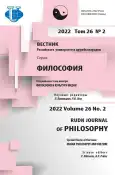On the Possibility оf a Dual-Natured Self
- Authors: Vaidya A.J.1
-
Affiliations:
- San Jose State University
- Issue: Vol 26, No 2 (2022): INDIAN PHILOSOPHY AND CULTURE
- Pages: 285-304
- Section: INDIAN PHILOSOPHY AND CULTURE
- URL: https://journal-vniispk.ru/2313-2302/article/view/325324
- DOI: https://doi.org/10.22363/2313-2302-2022-26-2-285-304
- ID: 325324
Cite item
Full Text
Abstract
In this paper I examine compatibilism and incompatibilism about whether the self can be both a subject and an object in the same awareness at the same time. While this is an old debate that many traditions of philosophy have contributed to, my point of departure is the work of A.C. Mukerji (an Indian philosopher of the modern era) who worked on the possibility of self-awareness by articulating, what he called, the paradox of ego-centricity. I also consider Patañjali (an Indian philosopher of the classical era), Maurice Merleau-Ponty (a phenomenologist), and Arindam Chakrabarti (a contemporary Indian and Analytic philosopher) on the debate over compatibilism. First, I present Mukerji’s paradox, then I critically examine Patañjali and Merleau-Ponty’s arguments against incompatibilism. I move on to bring Mukerji’s paradox into contact with Chakrabarti’s arguments in favor of compatibilism. I critically examine Chakrabarti’s arguments in favor of compatibilism and against incompatibilism. While insightful and powerful, I argue that they can be resisted; and should be considered alongside Mukerji’s paradox. I close by offering an argument for compatibilism based on an analogy with particle-wave duality in quantum physics and the relation between conceivability and metaphysical modality.
About the authors
Anand Jayprakash Vaidya
San Jose State University
Author for correspondence.
Email: anand.vaidya@sjsu.edu
ORCID iD: 0000-0002-0529-8876
Professor of Philosophy
Department of Philosophy, 1 Washington Square, San Jose, California, 95192, USAReferences
- Vaidya A. The Paradox of Ego-centricity. Sophia: Journal of International Philosophy and Traditions. 2019;58(1):25-30.
- Bhushan N, Garfield J. Minds Without Fear. Oxford: Oxford University Press; 2018.
- Evans G. The Varieties of Reference. Edited by John McDowell. Oxford: Oxford University Press; 1982.
- Kaplan D. Demonstratives: An Essay on the Semantics, Logic, Metaphysics and Epistemology of Demonstratives and Other Indexicals. In: Almog J, Perry J, Wettstein H. (editors). Themes from Kaplan. Oxford: Oxford University Press; 1989. P. 481-563.
- Ganeri J. Naturalism, Consciousness, and the First-Person Stance. Oxford: Oxford University Press; 2012.
- Chakrabarti A. Does Self-Awareness Turn the Self into an Object? In: Realisms Interlinked: Objects, Subjects and Other Subjects. London: Bloomsbury; 2020. P. 137-144.
- Ashton G. The Puzzle of Playful Matters in Non-Dualism Śaivism and Sāṃkhya: Reviving Prakṛti in the Sāṃkhya Kārikā through Goethean Organics. Religions. 11(5), 221. https://doi.org/10.3390/rel11050221
- Merleau-Ponty M. Phenomenology of Perception [Smith C, translator]. London: Routledge and Kegan Paul; 1962.
- Mishra RS. The Yoga Sūtras of Patañjali. New York: Baba Bhagvandas Publications Trust; 1987.
- Dreyfus H. Overcoming the Myth of the Mental. Topoi. 2006;(1-2):43-49.
- Csíkszentmihályi M. Flow. New York: Harper Collins Publishing; 1990.
- Vaidya A. Public-Philosophy: Cross-Cultural and Multi-Disciplinary. Journal of Comparative Philosophy. 2015;6(2):35-57.
- Shoemaker S. Causal and Metaphysical Necessity. Pacific Philosophical Quarterly. 1998;79(1):59-77.
- Priest G, Berto F, Weber Z. Dialetheism. In Zalta EN, editor. The Stanford Encyclopedia of Philosophy (Fall 2018 Edition). 2018. Available at: https://plato.stanford.edu/archives/fall2018/entries/dialetheism/
Supplementary files









